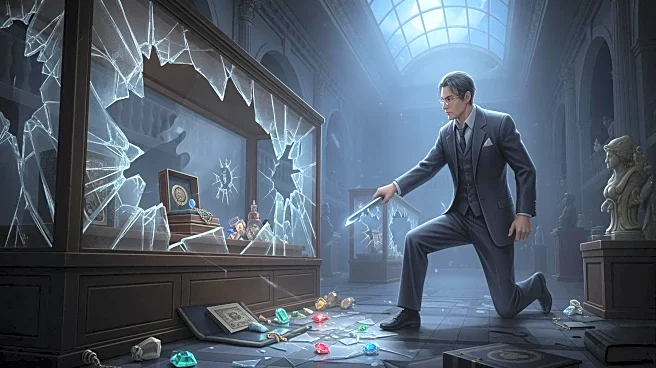What's Happening?
A daring heist at The Louvre, one of the world's most-visited museums, has led Paris Prosecutor Laure Beccuau to investigate whether the theft was commissioned by a collector. The robbery involved masked
thieves disguised as construction workers who used mini gas-powered chainsaws to break into the museum and steal priceless jewels. The thieves targeted nine objects, successfully stealing eight, while losing the crown of Empress Eugenie during their escape. The stolen items are believed to be worth tens of millions of euros. The heist, which took place in front of visitors and workers, has prompted the museum to remain closed for further investigation. France's Interior Minister Laurent Nunez has entrusted the probe to a specialized police unit known for solving high-profile robberies.
Why It's Important?
The Louvre heist highlights vulnerabilities in security at major cultural institutions and raises concerns about organized crime's involvement in art theft. If the robbery was indeed commissioned by a collector, it underscores the demand for stolen art and artifacts in underground markets. This incident could lead to increased security measures at museums worldwide and prompt a reevaluation of how cultural treasures are protected. The theft also has implications for the art market, as stolen pieces may be used to launder money from other criminal activities, potentially affecting legitimate transactions and valuations.
What's Next?
Authorities are continuing their investigation, keeping all leads open while largely ruling out foreign interference. The specialized police unit handling the case is expected to follow up on the hypothesis of organized crime involvement. The Louvre's closure may lead to heightened security protocols and possibly influence other museums to reassess their security measures. The art community and law enforcement agencies may collaborate to track down the stolen items and prevent future incidents. The investigation's outcome could impact public policy regarding art theft and cultural heritage protection.
Beyond the Headlines
The Louvre heist may prompt discussions on the ethical responsibilities of collectors and the art market's role in facilitating illegal activities. It raises questions about the cultural value of stolen artifacts and the impact of their loss on historical preservation. The incident could lead to long-term shifts in how museums and galleries approach security and collaboration with law enforcement. Additionally, it may influence public perception of art theft and organized crime, highlighting the need for international cooperation in protecting cultural heritage.











